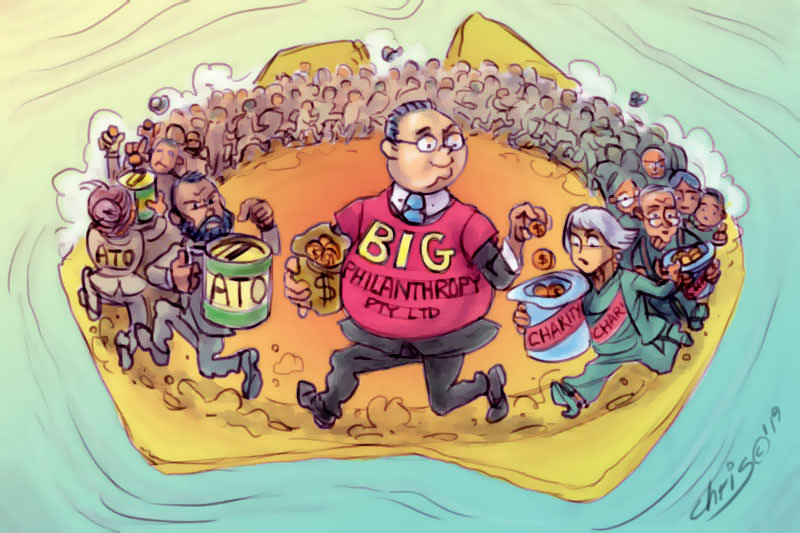Extract from Eureka Street
- John Falzon
- 22 March 2019
One of the stranger reactions to franking credit reform was Prime Minister Morrison's claim it 'undermines the incredible work done by charities across Australia, including the fight against cancer', backing up Cancer Council Queensland's assertion that 'Two of our major donors ... have advised CCQ that they are unlikely to be in a position to donate if this policy is introduced.' CCQ has since withdrawn its submission on this issue but the government continues to correlate franking credit reform with the erosion of philanthropy.

For the record I support the proposed reform of franking credits. It is not, as some mischievously claim, a tax. It is the removal of a tax rebate that is currently provided to some wealthy retirees even though they are not actually paying the tax they are getting the rebate on! It's already confusing but it doesn't help when the waters are muddied with outright falsehoods. This is well explained by my Per Capita colleagues Emma Dawson and Tim Lyons in a recent opinion piece.
What I want to reflect on here though is the reasonable question as to whether the purported impact on philanthropy cited above should, in general terms, be a consideration when weighing up public policy.
'Philanthropy', muses advertising agency owner Bert Cooper in one of the early episodes of Mad Men, 'is the gateway to power.' This is a rather cynical view of the act of giving but it is not without some truth in some cases, namely when the already powerful use discretionary funds to promote their own interests instead of the public interest. Philanthropy is considered primarily as a gateway to doing good in Australia. The work of charities and not-for-profits is highly respected and valued.
I say this as someone who has worked in the community sector for most of my adult life, including 17 years with Vinnies, 12 of which I served as the national council CEO. What I learned was that philanthropy is carried out not only by wealthy individuals but by people who are seriously struggling to make ends meet; people who, having gone through hard times, decide to give what is in effect a massive chunk of their meagre incomes, not as a paternalistic act of charity, but as a powerful act of human solidarity. What it made me ask though was how we arrived at a situation where charities have become the default mode of delivering essential social services.
The excellent work of charities, including the generous work of volunteers, should not be a means of letting governments off the hook when it comes to fulfilling their responsibilities to properly fund, and take responsibility for, essential services. Listening to the stories of people who bear the brunt of inequality, I learned that people do not want to have to rely on charity; they want to be able to count on justice. And charity is never a substitute for justice.
But it is constructed precisely in this way when governments abrogate their responsibilities. And along with this construct comes the perverse notion that discretionary philanthropy could be a substitute for compulsory taxation. At a time when the ATO reports that a third of large Australian companies paid no tax, despite benefitting and profiting from publicly funded infrastructure, this position was eloquently refuted by Dutch historian Rutger Bregman at Davos recently.
"The fundamentals of a fair society are the responsibility not of charity but of government."
How do we, as a society, determine whether something is essential enough to be guaranteed public funding, rather than being dependant on discretionary philanthropy? We would recoil at the thought of our armed forces needing to depend on philanthropic donations in order to do their job. We are fine with the thought of being able to make donations to political campaigns but would find it rather weird if, for example, the Office of the Prime Minister needed philanthropy to properly function. Governments provide significant funding for health and social services, including homelessness services, but we seem to accept as a society that for these areas of public good to come even close to meeting public need we need to significantly augment public funding with discretionary philanthropic funding. Why?
The fundamentals of a fair society are the responsibility not of charity but of government. Government is the chief means by which we can collectively achieve what we cannot achieve alone: our infrastructure, including our social infrastructure — education, health, housing, social services, transport. Big businesses sometimes use the argument that they are generous philanthropists and therefore should be spared the unwanted scrutiny regarding their failure to pay taxes (or, in some cases, workers!). Philanthropy is not a substitute for progressive taxation. And it is not an excuse for wage theft.
Neither tax nor social expenditure is discretionary. The market idolaters constantly remind us that you get what you pay for and that we are all consumers who should pay only for what we want and can afford. They dismiss anything else as rank socialism. But as the 2018 World Inequality Report notes: 'Economic inequality is largely driven by the unequal ownership of capital, which can be either privately or public owned ... Since 1980, very large transfers of public to private wealth occurred in nearly all countries, whether rich or emerging. While national wealth has substantially increased, public wealth is now negative or close to zero in rich countries. Arguably this limits the ability of governments to tackle inequality ...'
The reality is that our society works best when we collectively ensure that the essentials of a good society are not left to the market but are guaranteed by government. Hence the well-established belief that no child should be denied the highest quality public education and that no one should be denied the highest quality healthcare. Sadly, these are struggles that continue but the level of public support for these propositions is high. When we allow government to abrogate its responsibilities to the people, we find (in my view, false) comfort in the thought that charitable organisations will fill the gap.
But what kind of society are we allowing ourselves to become in the process? We have seen from recent history that government outsourcing of essential services to the not-for-profit sector is often simply stage one in the trajectory that leads to the responsibility (and the public funding) going to for-profit providers. A strong civil society, with diverse movements and organisations large and small, is essential to a robust democracy. We should protect and support the right of civil society organisations to engage in service to the community, social activism, research, and advocacy.
Civil society organisations are particularly well placed to provide a space for people to have a voice, especially the people who are described by the Indian writer Arundhati Roy as being 'deliberately silenced and preferably unheard'. These organisations should feel safe to speak and amplify the truth and should not feel the need to self-censor because of concerns about the withdrawal of funds by either government or private donors. Philanthropy can be a real force for good, but it does not replace the role of government doing its job.
We get what we collectively pay for. When government walks away from its responsibility to support and protect the wellbeing of its people, we lose the right to democratically determine what we want to collectively pay for. If corporations and high wealth individuals are not kicking in their fair share it means there's less in the common pool to make sure no one misses out on the essentials of life. In the meantime the private stashes, some of them safely offshore in tax havens, fatten up nicely.
The 2018 Social Progress Index saw Australia slipping from fourth to 15th place over two years, a decline attributed in part to the concentration of political power among the wealthy along with unequal access to health and education. Nobody wants to inhibit philanthropy, but it is not the starting point for ensuring that we arrive at a fair society.
 Dr
John Falzon is Senior Fellow, Inequality and Social Justice, at public
policy think tank, Per Capita. He was national CEO of the St Vincent de
Paul Society from 2012 to 2018.
Dr
John Falzon is Senior Fellow, Inequality and Social Justice, at public
policy think tank, Per Capita. He was national CEO of the St Vincent de
Paul Society from 2012 to 2018.
No comments:
Post a Comment